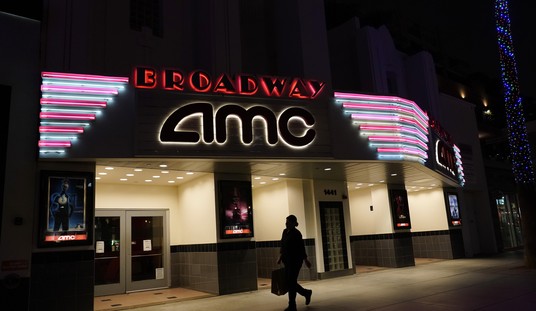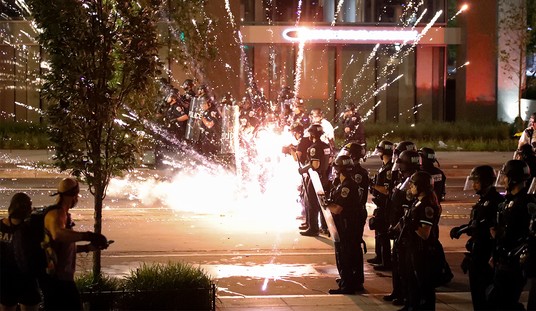The lesson in this story, besides that irony is often delicious? Redistributionism always looks better when you don’t own anything yourself (via JWF):
Occupy Wall Street protesters said yesterday that packs of brazen crooks within their ranks have been robbing their fellow demonstrators blind, making off with pricey cameras, phones and laptops — and even a hefty bundle of donated cash and food.
“Stealing is our biggest problem at the moment,” said Nan Terrie, 18, a kitchen and legal-team volunteer from Fort Lauderdale.
“I had my Mac stolen — that was like $5,500. Every night, something else is gone. Last night, our entire [kitchen] budget for the day was stolen, so the first thing I had to do was . . . get the message out to our supporters that we needed food!”
Crafty cat burglars sneaked into the makeshift kitchen at Zuccotti Park overnight and swiped as much as $2,500 in donated greenbacks from right under the noses of volunteers who’d fallen asleep after a long day whipping up meals for the hundreds of hungry protesters, the volunteers said.
Who’d have thought that a crowd of people demanding the seizure of wealth from banks, corporations, and the wealthy might also have a few thieves? I’m shocked, shocked to find theft occurring in a group that has hijacked private property it refuses to leave. I can’t imagine that a crowd that demands free higher education and the forgiveness of tens of thousands in student debt would also think of someone’s Mac or an iPhone as equally as communal as a college education.
The best part of this story is that it sounds like the thieves might be creating a few proto-conservatives:
Security volunteer Harry Wyman, 22, of Brooklyn was furious about the thievery — and vowed to get tough with the predatory perps.
“I’m not getting paid, but I’m not gonna stand for it. Why people got to come here and do stupid stuff? All it does is make people not wanna come here anymore,” Wyman fumed.
Law and order! Get tough on crime! Defend private property! Hey, maybe there isn’t that much difference between this and a Tea Party after all — just a few years of experience and a couple of eye-opening insights on freeloaders. In my column for The Week, I take a more serious look at the similarities between the two movements, and explain why the Occupiers are heading into an intellectual and political dead end:
So far, the Occupy protests have mainly drawn the usual suspects — anarchists and ideologues who spend their lives attempting to provoke responses from police and gain media attention. Some of the same organizations — unions, AGJ — have agitated at World Trade Organizations and G-8 summits, most notably in Seattle in 1999. In St. Paul, Minn., I saw the same kind of activists form into the umbrella RNC Welcoming Committee and organize violent protests at the Republican National Convention. But could this turn into something more?
It’s not out of the question. Those protests took place during periods of prosperity — in the latter case, before the recession became a collapse — and remained fringe affairs. That is certainly not the case any longer with Occupy, which is why targeting Wall Street will hit more of a resonant chord. The pressure of a chronic economic malaise means that we have millions of people who had been gainfully employed a few years ago who now find themselves outside of the economic system, with no stake in the status quo. They might find themselves agreeing with either movement — and on the streets demanding change of some sort. Right now, the attention is on Occupy, and that may draw a significant number of angry people who wouldn’t normally sympathize with hard-Left groups like AGJ or consider joining a union unless forced to do so.
However, the emphasis on Wall Street rather than Washington as the focus of anger and blame puts Occupy into an intellectual paradox that will likely limit its impact. Certainly Wall Street bears its share of responsibility for creating toxic derivatives that nearly killed the financial sector. But the derivatives failed because the securities on which they were based – congressionally-approved Fannie Mae and Freddie Mac securities – turned out to be junk bonds. The current issues of spending and debt originate in Congress, where the Democrats who replaced Republicans in 2006 promising fiscal responsibility turned out worse than their GOP predecessorts, ballooning deficits to well past a trillion dollars a year.
In this the Tea Party has a coherent ideology that opposes government interventions in private markets and runaway spending and debt: They want a smaller government. Occupy protests many of the same problems, but in response to these issues, the Occupy movement wants a bigger federal government that would punish banks and wealthy Americans. They apparently want seizures and redistribution, which necessarily means more bureaucracies, higher spending, and many more opportunities for collusion between authorities and monied interests in one way or another.
Right now, they’re also in the process of learning some hard truths about human nature, and why a fairly regulated free-market system works best to allow a channel for the natural self-interest of individuals to put capital to work and create wealth.
Update: Is there any such thing as a $5,500 Mac laptop? I built my own MacBook Pro with every option on the laptop itself at the Apple store, and only came up with a price of $3,447. I could also choose 6 or 12 month financing, but that would just put me in debt to the corporations, dude. It looks like Nan’s mommy and daddy bought the Mac and Nan doesn’t have a clue about its value.








Join the conversation as a VIP Member